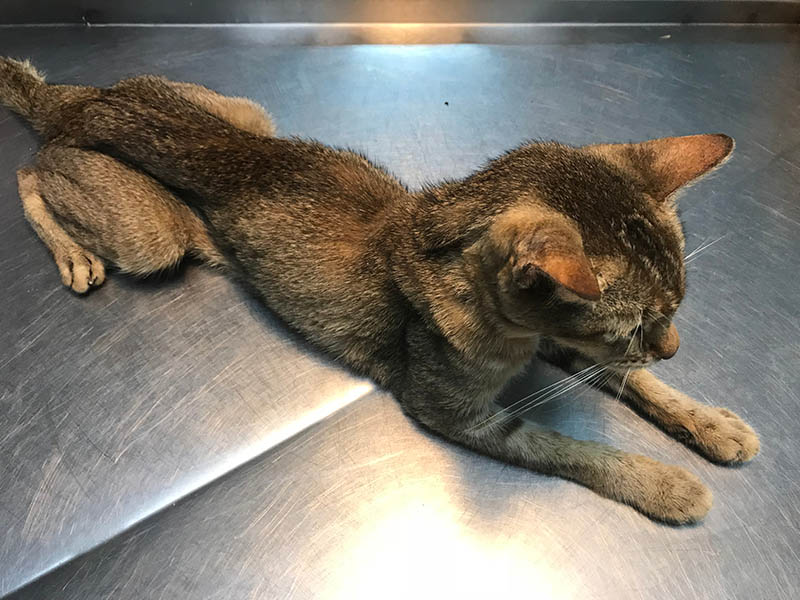The average feline lifespan has increased over the years, and today it’s relatively common to meet cats that are 20, 21, 22, and even 23 years old! And while they are considered “seniors” at the ripe old age of 11 (and geriatric at 15), many don’t slow down until much later.
Weight loss is one of the most common signs of feline aging. While it can be related to a general lack of interest in new food, it’s often an early sign of illness and, as such, should never be ignored. Cats of any age who don’t eat for 24–36 hours are at risk of developing fatal hepatic lipidosis, which can be fatal if allowed to progress.
Read on to learn more about the 10 most common reasons older cats lose weight and a few tips on how to keep your buddy healthy as they age.
The 10 Common Reasons Your Older Cat Is Losing Weight
1. Dietary Changes
Cats are notoriously finicky eaters, and some don’t appreciate dietary changes. If you’ve recently switched your cat to a senior formulation or a prescription diet designed to support urinary tract or kidney health, your cat may still be adjusting to their new food.
To prevent this from happening, make sure to slowly transition your cat from one type of food to another over at least 7 days. Start by adding a small amount of the new product to the food your cat is accustomed to.
Then increase the amount of the new option just a bit every day while at the same time decreasing how much old food you give your cat. Never let an elderly cat or a kitty suffering from chronic kidney disease go without eating for more than 24 hours before having them evaluated by a veterinarian.
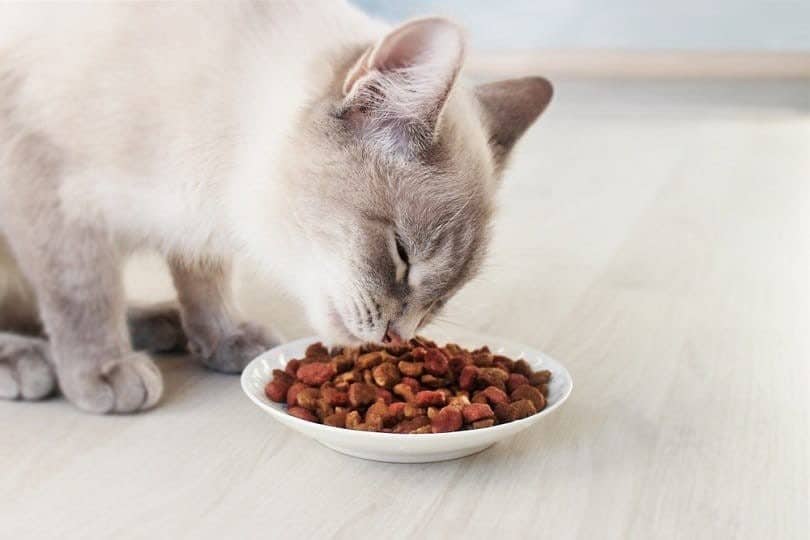
2. Dental Disease
Dental disease is a relatively common cause of senior feline weight loss. Cats often suffer from dental diseases such as gingivitis and periodontitis as they age. These gum diseases can create painful abscesses that make it painful for kitties to chew and can even lead to tooth loss.
Common symptoms include bad breath, drooling, tilting the head to one side while eating, and loss of appetite. If the situation becomes serious enough, your cat may need to have one or more teeth pulled. When it comes to dental disease, prevention is hands down the best option.
Regular tooth brushing between veterinary visits and regular professional teeth cleanings under anesthesia are the best ways to keep your cat’s teeth nice and healthy. Make sure to use feline-specific veterinary toothpaste when brushing your cat’s teeth, as human dental care products often contain fluoride, which is toxic to cats.
3. Chronic Kidney Disease (CDK)
Chronic kidney disease is a common disease seen in elderly cats. While there’s no cure, it can often be managed with lifestyle changes such as feeding low protein, low phosphorus food designed to support kidney health and bumping up the amount of water your cat drinks. Increased water intake makes it easier for your cat’s kidneys to flush toxins from its body.
Cats suffering from chronic kidney disease often have trouble with anemia and high blood pressure. And the buildup of toxins in the bloodstream as the kidneys become less efficient often results in cats feeling sick, becoming lethargic, and losing interest in food.
With supportive therapy, cats diagnosed with CDK can live for anywhere from a few months to several years, depending on the stage at which the disease is discovered and the cat’s tolerance of the required treatments.
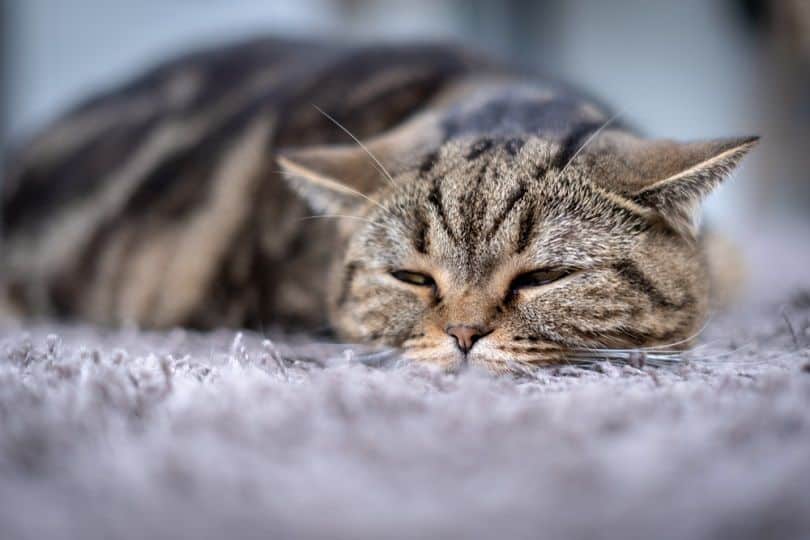
4. Diabetes
Diabetes affects a cat’s ability to produce or efficiently use insulin. It occurs most often in overweight, older male cats that don’t get much exercise. Obese cats are at serious risk for developing the condition; they’re four times more likely to end up diabetic than cats that don’t suffer from weight issues.
Long-term use of steroids can also contribute to the development of feline diabetes. There are technically two types of diabetes: type 1 and type 2. Most cats suffer from type 2 diabetes, and their bodies no longer respond appropriately to insulin. As a result, their blood glucose levels remain high while their cells can’t receive the food needed to support organ function.
The most common symptoms include weight loss without a corresponding decrease in food intake, increased urination, and higher fluid intake than usual. Treatment most often involves dietary changes and insulin injections.
5. Hyperthyroidism
Hyperthyroidism, otherwise known as thyrotoxicosis, is another disease veterinarians commonly encounter in cats over 11 years old. It happens when your cat’s thyroid starts producing too much of the T3 or T4 thyroid hormone and is commonly accompanied by excessive thyroid gland growth or the presence of an adenoma, a common benign feline tumor.
Veterinarians and scientists aren’t sure what causes thyroid disease in cats, although there is speculation that the condition is associated with exposure to environmental toxins. Common symptoms include weight loss as well as increased appetite, urination, and fluid intake. Some cats have gastrointestinal difficulties, such as vomiting and diarrhea.
Blood tests and a physical exam are often used during diagnosis. Treatment options include medication, iodine treatment, surgery, and dietary changes. Radioactive iodine, the most common treatment, requires just one injection of a radioactive isotope and usually results in the restoration of thyroid function within months.
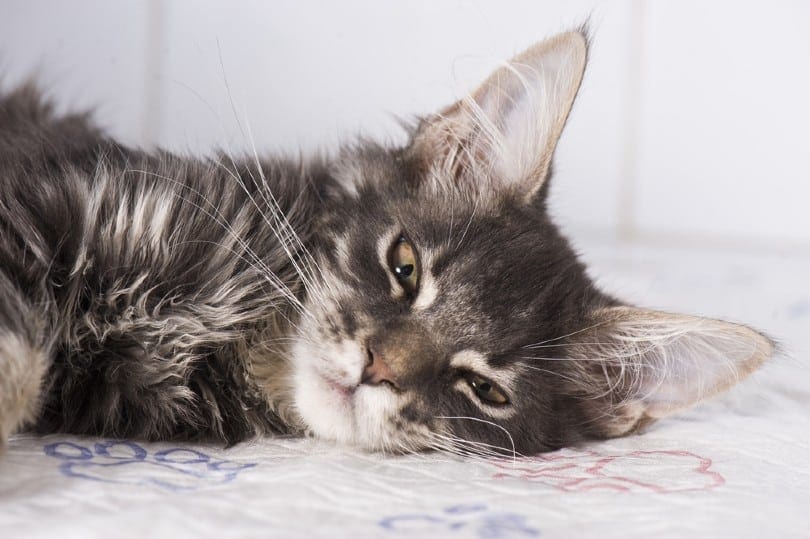
6. Maintenance Energy Increases
Cats require more energy as they age to prevent weight loss! Weight loss without a medical reason is so common in older cats that it even has a medical name, sarcopenia! Kittens require a ton of protein, fat, and calories to support their growing bodies.
After a cat reaches adulthood (when they’re around 18 months or so), those energy needs start to level out and then begin to decline. To maintain a healthy weight, most adult cats require around 3% less food every year. This shifts when cats become seniors and start needing more food.
Cats that don’t get enough calories often end up losing weight. Older cats typically lose fat and muscle in equal proportions, making it hard for human companions to see weight loss, as many cats retain their overall shape until they become clinically underweight.
7. Feline Dementia
Cats have fantastic memories; they can recognize beloved humans for up to 10 years, navigate thousands of miles to return home after a move, and deeply mourn the loss of animal and human companions. Unfortunately, kitties can also suffer from cognitive decline, including feline dementia.
No one is sure what causes the condition. However, veterinarians suspect gradual changes begin to occur when an affected cat reaches 10 or so and continue undetected until there’s so much deterioration that behavioral changes become impossible to miss. Common symptoms include disorientation, reduced activity, lack of interest in interacting with humans, and going to the bathroom in inappropriate places.
Some cats with the condition show little interest in food and, as a result, begin to lose weight. There’s no cure for feline dementia, so “treatment” aims to keep your cat healthy as possible and give them the best possible quality of life.
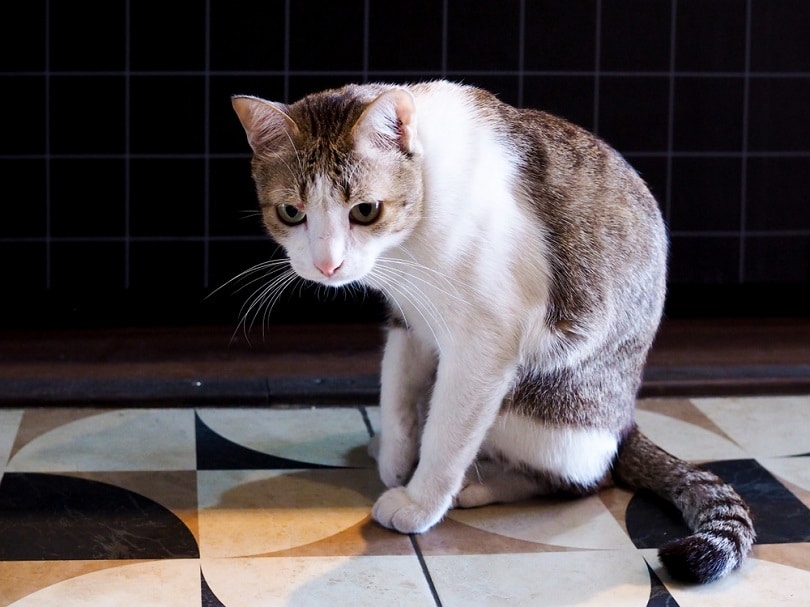
8. Inflammatory Bowel Disease (IBD)
Cats suffering from inflammatory bowel disease often lose weight because their bodies struggle to digest food due to digestive tract inflammation. While the condition is found in cats of all ages, it’s most common in kitties over 10 years old.
It’s surprisingly similar to both human and canine IBD when it comes to symptoms and treatment. Although the precise causes of the condition haven’t yet been identified, it appears the disease is linked to the way the immune system interacts with the environment, the food a cat eats, and gut bacteria.
The most common symptoms of IBD are weight loss, diarrhea, vomiting, lethargy, and appetite loss. Diagnosing feline IBD can be difficult as many of the condition’s symptoms overlap those of other diseases commonly seen in older cats, including cancer and leukemia. Blood tests, fecal analysis, and X-rays are regularly used to narrow things down.
9. Exocrine Pancreatic Insufficiency (EPI)
EPI occurs when a cat’s pancreas has suffered so much damage that it can no longer properly produce digestive enzymes. Weight loss is characteristic of the condition as digestive enzymes are required for your cat to adequately break down food to obtain the nutrients they need to thrive.
Symptoms of the disease include weight loss, diarrhea, loss of appetite, and a dull coat. Chronic pancreatitis is the most common cause of the condition, particularly in older cats. Veterinarians rely mostly on blood tests to diagnose the disease. But keep in mind that up to 50% of kitties with the condition have multiple health problems that must be addressed.
Treatment most often involves dietary supplementation to ensure your cat gets all the nutrients they need for digestion. Many veterinarians prescribe supplements such as cobalamin and folate to address digestive enzyme deficiencies.
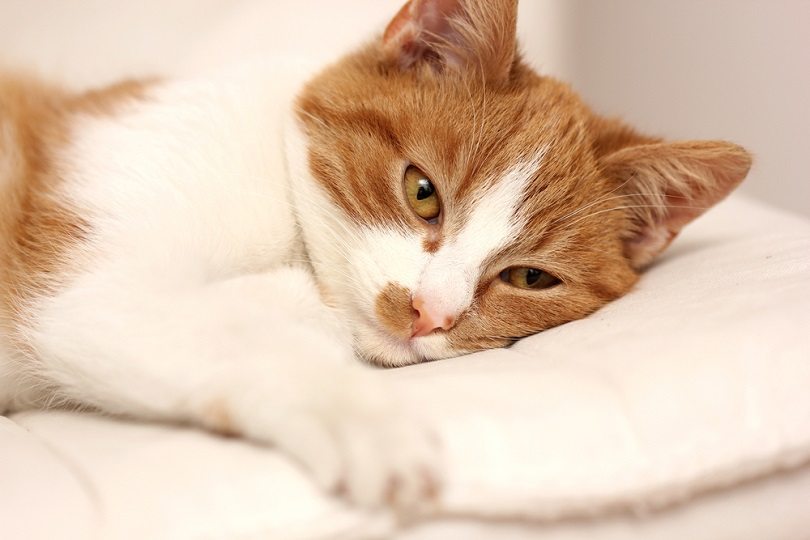
10. Arthritis
If your cat is in chronic pain due to osteoarthritis, there’s a good chance it’ll reduce its food intake and start to lose weight. Other signs a cat may be suffering from arthritis include gait changes and a reluctance to jump. Many cats with the condition walk gingerly, won’t go near stairs, and generally have no interest in physical activity.
Pain relief is vital when it comes to arthritis, but do your homework before giving your cat any prescription painkillers. Meloxicam, a popular non-steroidal anti-inflammatory often prescribed for feline pain, can be problematic.
The drug carries a black box label in the United States due to the high rate of feline fatalities related to kidney failure associated with the medication. The FDA has only approved the injectable version of the drug for one-time use in cats. Meloxicam oral suspensions and nasal sprays with the drug have not been approved for feline use.
 Conclusion
Conclusion
Older cats can lose weight for several reasons, including dietary changes, digestive difficulties, and systemic diseases such as diabetes and hyperthyroidism. Most veterinarians recommend that cats over the age of 11 have twice-yearly checkups along with regular blood tests to keep an eye on their liver function, kidney health, and blood sugar levels.
But even with regular veterinary visits, high-quality food, and plenty of love, it’s surprisingly common for older cats to lose weight and become relatively thin over time. Advocate for your cat and insist on a full workup if you notice symptoms of illness such as a refusal to eat in addition to weight loss.
Image Credit: M. Sam, Shutterstock

